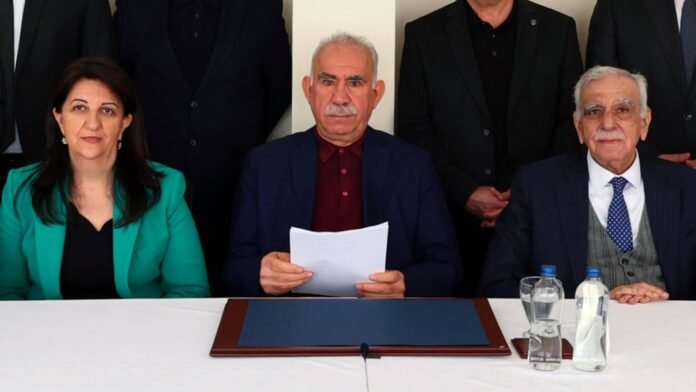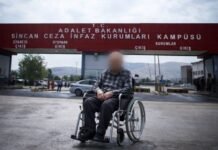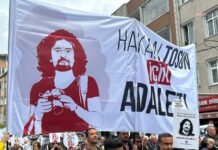Abdullah Öcalan, jailed leader of the outlawed Kurdistan Workers’ Party (PKK), has called on the Turkish government to adopt the “right to hope,” a legal principle allowing prisoners serving life sentences to be considered for conditional release, saying that it’s a necessary step that affects thousands of prisoners, Turkish Minute reported.
Öcalan’s remarks were conveyed by his lawyers from the İstanbul-based Asrın Law Office, who met with him on the İmralı prison island earlier this week. The visit marked a rare opportunity for the lawyers to speak with the PKK leader, who has been serving a life sentence since his capture and extradition to Turkey in 1999.
According to the lawyers’ statement, Öcalan, 76, said, “The ‘right to hope’ is a step the state must take. It needs to lift this burden. This issue affects thousands of people. From any perspective, it must be resolved. Law, politics and justice all require it.”
Lawyers cite ECtHR decision and Council of Europe call
In their statement, the lawyers recalled that the Council of Europe’s Committee of Ministers, in a session held in mid-September, once again urged Turkey to bring its laws in line with a European Court of Human Rights (ECtHR) judgment on the “right to hope.”
The Committee of Ministers in an interim resolution said Turkey should introduce legal reforms to ensure prisoners sentenced to life have a chance of release after serving a minimum period based on the relevant ECtHR ruling.
The lawyers said Öcalan emphasized that this principle was essential to ensure compliance with international human rights norms. They quoted him as saying that the issue is not only a matter of legal reform but also of justice and reconciliation affecting society as a whole.
“The state must remove this burden,” Öcalan said, referring to Turkey’s legal framework that currently excludes those sentenced to aggravated life imprisonment such as himself from eligibility for parole.
According to the latest data compiled by the Civil Society in the Penal System Association (CISST), 1,453 people in Turkey are serving aggravated life sentences, while no up-to-date public data are available on those serving standard life terms.
The debate about the “right to hope” was rekindled in Turkey as part of an ongoing peace process with the PKK, as a result of which the PKK decided to end its decades-long armed campaign against Turkey.
The PKK, which has waged an armed insurgency against the Turkish state since the 1980s, is designated as a terrorist organization by Turkey and its Western allies.
The renewed peace process with the PKK was initiated in October 2024 by far-right Nationalist Movement Party (MHP) leader Devlet Bahçeli, a key government ally. Bahçeli publicly called on Öcalan to urge the militant group to lay down its arms.
He said Öcalan could benefit from the “right to hope” if he renounced terrorism and called on the PKK to lay down its weapons. Öcalan responded in February with a message calling on the PKK to disarm and disband.
The PKK decided in May to disband, disarm and end its armed campaign, saying it “has completed its historic mission” in line with Öcalan’s call.
Thirty PKK militants burned their weapons in a ceremony in northern Iraq in July, marking a symbolic first step towards ending the decades-long conflict with Turkey in which more than 40,000 people have been killed.
Call for ‘democratic integration’
The Asrın Law Office also said Öcalan insisted that genuine peace in Turkey requires the full inclusion of Kurds in the country’s legal and political systems.
“He said Kurds as a whole must be incorporated into the framework of law and that true peace lies in this integration,” their statement read. “Until now, Kurdish rights have been ignored and kept outside the law. Today, a democratic integration of law must be established.”
The lawyers added that Öcalan described the right to live freely as essential to a meaningful life. “If life is to be lived freely, it must be meaningful,” he reportedly said, adding, “As I have said before: ‘Oh life! Either I will live you freely, or you will not be lived at all.’ That is my motto.”
What is the ‘right to hope’?
The “right to hope” refers to the legal principle that allows a prisoner’s conditional release to be considered after serving part of their sentence, based on good behavior and other criteria set by law. It aims to encourage rehabilitation and reintegration rather than permanent exclusion from society.
The concept was solidified in the 2013 ECtHR judgment in Vinter and Others v. the United Kingdom, which held that life sentences must be subject to review after no more than 25 years, ensuring that prisoners have a genuine possibility of release.
The ruling has since guided human rights standards across Europe. However, Turkey’s penal code does not currently allow sentence reviews or parole for those serving aggravated life sentences, effectively denying them any prospect of release.















